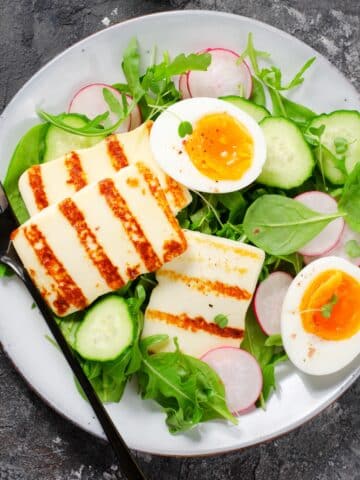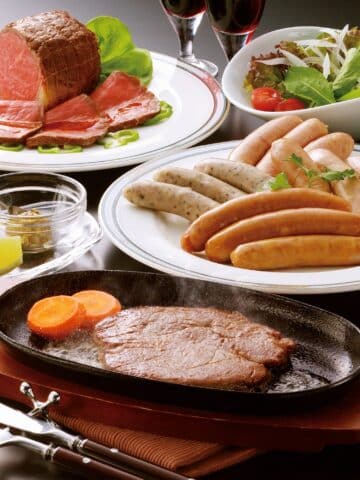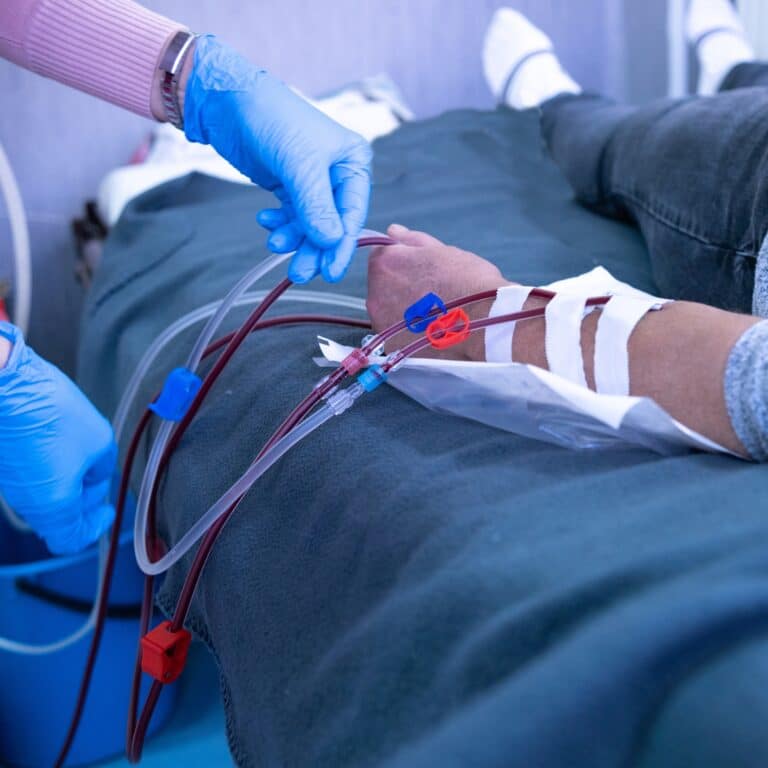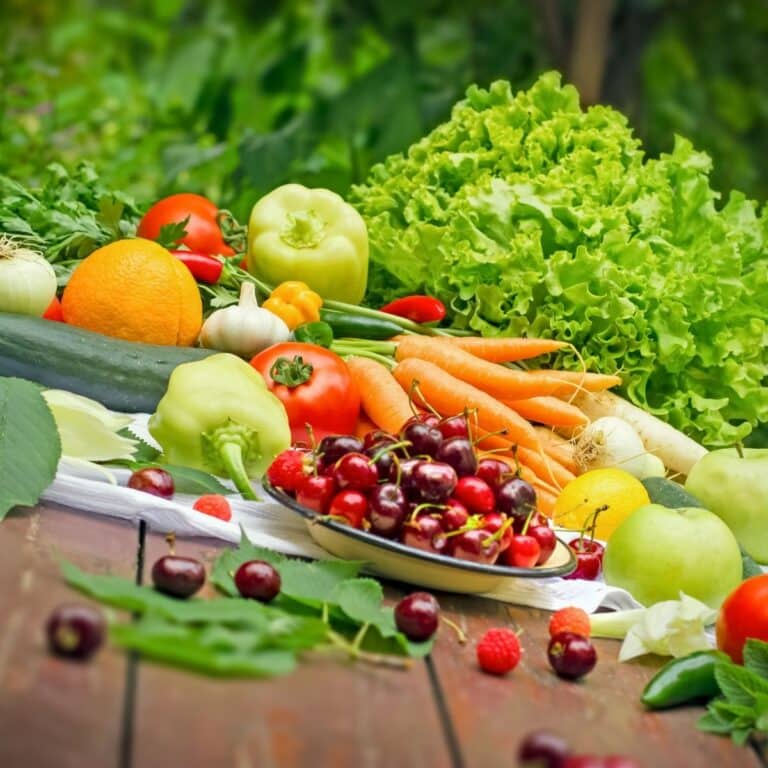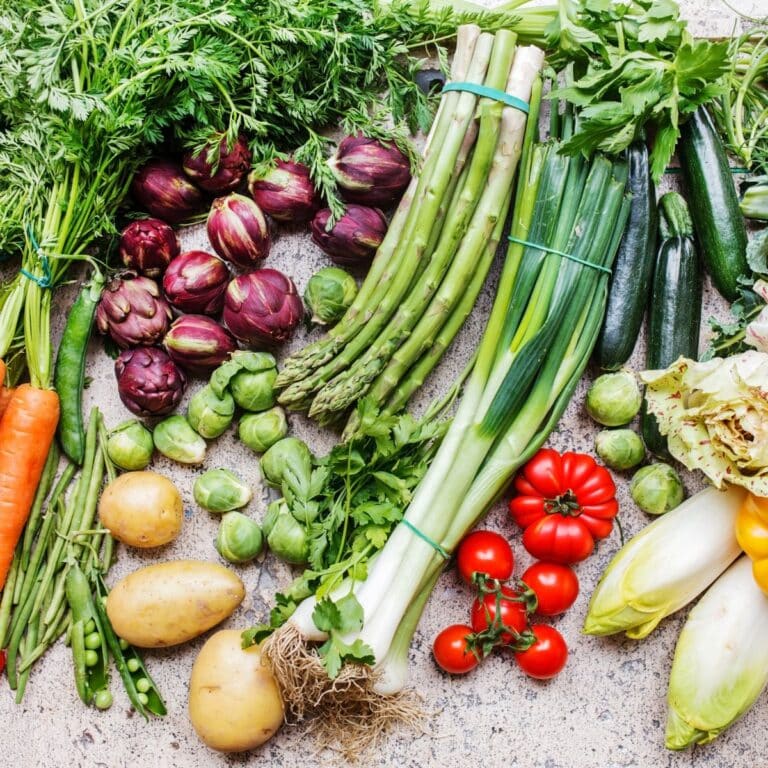Chronic Kidney Disease Diet Food List
Chronic kidney disease can be a difficult diagnosis to accept, and the dietary restrictions that come with it can seem overwhelming.
However, by understanding what foods are most beneficial for people with chronic kidney disease, we can make sure our diets provide us with all the nutrients we need while still helping manage this condition.
In this article, we'll look at a comprehensive food list designed to help people with kidney disease stay healthy and happy through their meals.
By planning ahead and stocking up on nutrient-dense ingredients from this list, you'll have more control over your health without having to compromise taste or nutrition.
There's no reason why managing your diet should stop you from enjoying delicious food – let's get started!

Jump to:
- Overview Of Chronic Kidney Disease
- Nutrition And Eating Habits
- What To Eat On A Renal Diet
- Foods To Avoid
- Meal Planning Tips
- Nutrition Labels
- Hydration Guidelines
- Nutrient Supplements
- Alternative Therapies For CKD Treatment
- FAQs for Meal Planning for CKD
- A Renal Diet Food List Can Help You Live Life To The Fullest
Overview Of Chronic Kidney Disease
Chronic Kidney Disease is a long-term condition caused by damage to the kidneys. Its main symptoms are fatigue, poor appetite, and swelling in the legs, feet, or hands. Treatment typically includes lifestyle changes such as diet and exercise, and medication to reduce symptoms and slow the progression of the disease.
A diet for people with Chronic Kidney Disease should consist of low-sodium, low-potassium, and low-phosphorus foods, as well as adequate hydration.
Common foods on a Chronic Kidney Disease diet food list include lean protein sources, low-sodium vegetables, and fruits that are low in potassium.
For More Recipes and Ideas --->> Get Your Free Meals and Recipes That Are Perfect for Pre-Dialysis Diets, Pre-Dialysis with Diabetes, or Dialysis Diets.
Causes
When we think of chronic kidney disease, or CKD for short, it can be easy to forget the seriousness of this condition.
Diabetes-related CKD is one of the most common causes; diabetes affects blood vessels, thereby affecting blood flow and disrupts how kidneys function, increasing the risk of renal failure over time.
Chronic kidney disease can be caused by a range of other conditions, including hypertension, lupus, chronic glomerulonephritis, and heritable conditions like polycystic kidney disease.
Hypertension, or high blood pressure, can cause the arteries in the kidneys to become narrower, leading to decreased kidney function.
Lupus is an autoimmune disorder in which the body’s immune system attacks its own organs and tissues, including the kidneys. Chronic glomerulonephritis is an inflammation of the glomeruli, or tiny filters in the kidneys, and can lead to the eventual loss of kidney function.
Polycystic kidney disease is a heritable condition in which fluid-filled cysts form in the kidneys, causing them to become enlarged and unable to filter toxins from the body.
All of these conditions can lead to chronic kidney disease and can require treatment or lifestyle modifications to reduce the damage to the kidneys.
Diet can also contribute to kidney damage, as unhealthy diet increases the risk for chronic diseases like diabetes and hypertension. Lifestyle choices like smoking cigarettes and excessive drinking can also increase risk of developing CKD.
It's important that people stay mindful about all potential risks when considering their lifestyles and long term health outcomes. When it comes to your kidney health, prevention is always easier than trying to fix an existing problem. Taking precautions now will ensure a healthier future down the line.
Symptoms
Symptoms of chronic kidney disease (CKD) vary depending on how far the condition has progressed. Early stages of kidney disease are often symptomless, but as CKD progresses, symptoms can include fatigue, nausea and vomiting, decreased appetite, swelling in ankles and feet, muscle cramps at night, difficulty sleeping or concentrating and occasionally a decrease in urination.
Diagnosis criteria for CKD include evaluating medical history alongside blood tests to measure creatinine levels and glomerular filtration rate (GFR).
Making lifestyle modifications like quitting smoking and reducing alcohol consumption are essential risk factors for managing CKD. Reducing sodium intake and increasing physical activity can also help protect against further damage to the kidneys.
Treatment
Once you have been diagnosed with CKD, your doctor will likely recommend a combination of treatments to help slow ckd progression.
Exercise strategies, lifestyle changes, and weight management are all important components when it comes to managing the condition.
Regular physical activity can improve kidney function by increasing blood flow. Reducing sodium intake helps reduce pressure on the kidneys, allowing them to perform better and slow down progression of damage to the small blood vessels in the kidneys.
Furthermore, maintaining a healthy weight can decrease stress on organs like the heart and kidneys – this is especially true for people who suffer from obesity-related illnesses such as hypertension or type 2 diabetes.
Making sustainable lifestyle changes can help protect against worsening of symptoms in the future. Optimal treatment along with a healthy lifestyle can delay progression to advanced stages of kidney disease which requires dialysis or kidney transplant down the line.
By having a better understanding of what treatments are available, patients can work together with their healthcare provider to find an effective plan that works best for them.
Nutrition And Eating Habits
It's essential to understand the importance of proper nutrition and healthy eating habits for overall health. Creating healthy eating habits such as portion control and food selection can help ensure a balanced diet and adequate hydration.
Meal planning can also help with calorie counting and vitamin, protein, carb, fat, fiber, sugar, and sodium intake. Knowing how to incorporate these components into your diet is key for a healthy lifestyle.
Importance Of Proper Nutrition
When it comes to managing chronic kidney disease, a healthy eating plan is an important part of a successful treatment plan. Eating the right foods can help slow down the progression of this condition and reduce its symptoms.
It's essential for people with CKD to understand that lifestyle changes and physical activity must go hand in hand with diet control in order to maintain good health and overall wellbeing.
The first step towards improving dietary habits should involve eliminating certain unhealthy food items such as processed snacks, frozen dinners, soft drinks, convenience foods, sugary beverages, high-sodium canned goods, etc., which can have a detrimental effect on renal function.
Additionally, it’s important to focus on eating nutrient-rich foods like fruits, vegetables, lean proteins and whole grains instead.
Consider supplementing your meals with fiber-rich legumes or other plant-based sources of protein if necessary.
Lastly, drink enough fluids throughout the day but be mindful of how much you consume, as you may need to restrict fluids depending on your stage of kidney disease.
When making adjustments to your diet, remember that small changes over time are more effective than drastic measures when it comes to achieving long lasting results.
Healthy Eating Habits
It's important to be mindful of your eating habits when managing chronic kidney disease. This means taking the time to think about what you put into your body and how much of it you're consuming, as well as being aware of any cravings for unhealthy foods.
Practicing portion control for CKD patients can also help maintain a healthy diet by ensuring that you are not overeating or under-eating. Additionally, tracking food intake can provide valuable insight into patterns in which certain types of meals may trigger negative symptoms associated with CKD.
Eating healthily doesn't have to be complicated; start small by making simple changes like having fruits and vegetables instead of snacks and focusing on adding more nutrient-rich items to your plate. The key is to take actionable steps towards creating healthier eating habits so that you can enjoy delicious yet nutritious meals each day!
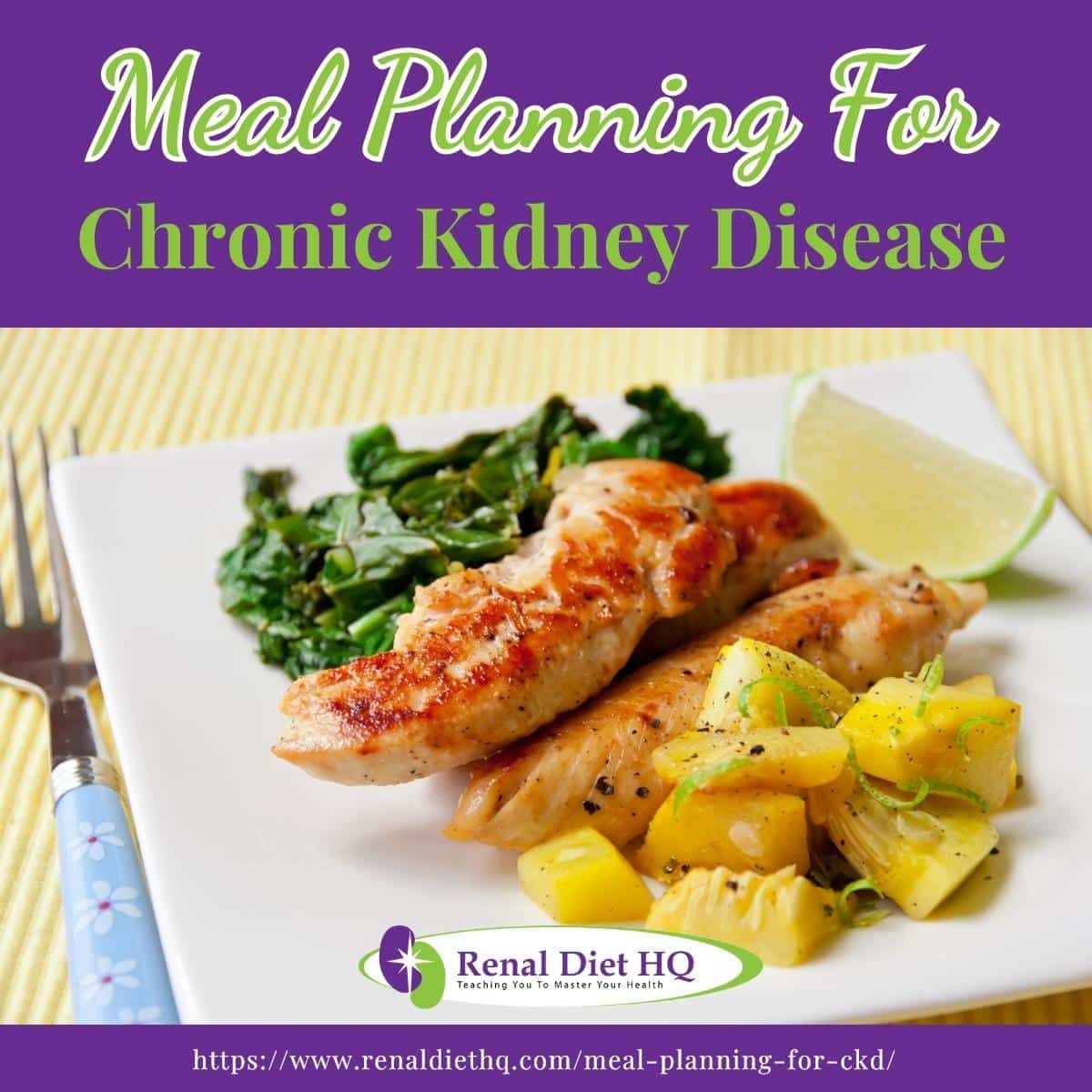
What To Eat On A Renal Diet
Among the general guidelines in a renal diet is consuming kidney-friendly foods with less protein, sodium, potassium, phosphorus, as well as processed foods. For those with advanced kidney disease on dialysis, more protein is required in the diet. Let’s dig deeper on what you can eat on a renal diet. Yes, there are dialysis diet restrictions to take note of.
Protein-Rich Foods
When it comes to following a renal diet, consuming the right amount of protein is key. Lean meat sources such as poultry and pork tenderloin are good options. Plant proteins like beans and lentils can also be incorporated into your meals.
Fish is an excellent source of lean protein too; some of the best choices for a renal diet include salmon, tuna, cod, haddock, and trout. Eating these types of foods will help keep you feeling satiated throughout the day while supporting your kidney health.
Why low protein diet in kidney disease? Depending on the stage of your kidney disease, you may need to restrict protein consumption as protein requirements will vary depending on many factors.
Hence, be sure that you are guided by a healthcare provider such as your doctor or nutritionist every step of the way.
Low-Sodium Foods
When it comes to following a renal diet, watching your avoiding excess sodium is crucial to avoid high blood pressure and fluid buildup.
Luckily, there are plenty of low-sodium substitutes you can use in place of regular ingredients like soy sauce, Worcestershire sauce, and broth. You can try using salt substitutes and condiments for kidney disease such as herbs, spices, and vinegars to add flavor without the extra sodium.
Replacing processed meats with plant based proteins are also great options when looking for lower sodium foods; beans, lentils and tofu are all excellent choices that will help keep your meals flavorful while maintaining kidney health.
So don't be afraid to experiment with some new recipes if you are trying to control your sodium intake. With these alternatives, you'll be surprised at how delicious your dishes can taste!
Low Potassium Foods
If you are living with chronic kidney disease, it is important to choose low potassium foods. Potassium is an important electrolyte, and when kidney function is impaired, potassium builds up in the body.
Eating foods that are high in potassium can cause further damage to the kidneys and increase the risk of stroke and heart attack.
Fortunately, there are many low potassium foods that can be enjoyed while managing chronic kidney disease. A few examples of low potassium foods include:
• Fruits: Apples, pears, grapes, strawberries, blueberries, oranges, and watermelon
• Vegetables: Lettuce, spinach, asparagus, carrots, green beans, and mushrooms
• Grains: Oats, quinoa, barley, and corn
• Dairy: Milk, yogurt, and low-fat cheese
• Protein: Egg whites, lean beef, chicken, and fish
When it comes to choosing low potassium foods, it’s important to be mindful of food preparation. Boiling and steaming vegetables will help reduce the amount of potassium they contain, while avoiding canned fruits and vegetables because they may be high in sodium and potassium.
It is also important to watch portion sizes. Eating too much of even a low carb low potassium foods can cause an increase in potassium levels. To further reduce the amount of potassium you eat, there are several substitutions that can be made.
• Instead of having a banana, try an apple or a pear
• Instead of having a baked potato, try a boiled or steamed potato
• Instead of having a cup of orange juice, try a cup of cranberry or apple juice
• Instead of having yogurt, try low-fat cottage cheese
• Instead of having a hamburger, try a turkey burger
• Instead of having white rice, try brown rice
Finally, it is important to remember that fresh foods are always the best choice. Highly processed and packaged foods may contain hidden sources of potassium and sodium that could be detrimental to your health.
By choosing low potassium foods and making simple substitutions, you can easily manage your chronic kidney disease and maintain a healthy diet.
Low Phosphorus Foods
If you or a loved one is suffering from chronic kidney disease, you may need to limit your phosphorus intake in order to keep your kidneys healthy.
Phosphorus is a mineral found in many foods, and too much of it can worsen kidney function. Fortunately, there are many low phosphorus foods available that can help you maintain a healthy diet.
The best way to stick to a low phosphorus diet is to make sure that you are consuming plenty of fresh fruits and vegetables.
Fruits and vegetables are naturally low in phosphorus and provide essential vitamins and minerals for good health. Some excellent choices include apples, oranges, bananas, potatoes, carrots, spinach, and broccoli.
These can be eaten raw, cooked, or even juiced for an easy and nutritious snack.
In addition to fruits and vegetables, there are other foods that are low in phosphorus but still contain essential nutrients.
Whole grains such as quinoa, brown rice, oats, and barley are all great options. These can be used in place of white bread, pasta, and other refined grains that are higher in phosphorus.
Low phosphorus dairy products are also available. Skim milk, greek yogurt for ckd patients, and cheese made with low-fat milk are all good choices.
If you cannot find low phosphorus dairy products, you can also try using low-fat milk substitutes such as almond milk or coconut milk.
Beans and legumes are another great source of low phosphorus protein. Kidney beans, lentils, and chickpeas are all great options. They can be used in place of higher phosphorus proteins such as red meat, poultry, and fish.
Finally, it is important to watch out for hidden sources of phosphorus. Processed and packaged foods often contain added phosphorus in the form of preservatives and additives. Always check the label before purchasing any food to make sure it is low in phosphorus.
By following these tips and substituting low phosphorus foods whenever possible, you can make sure that you are getting all the nutrients you need while still maintaining a healthy phosphorus intake.
Eating a balanced diet is essential for managing chronic kidney disease, so make sure to choose low phosphorus foods whenever possible.
Foods To Avoid
Processed foods, like canned foods and fast food, are a big no-no when it comes to chronic kidney disease diets, as they contain too many additives, like trans fats and added sweeteners.
Salt, sugar, and red meat should also be avoided, as well as dairy, alcohol, and fried foods. Caffeine, refined carbohydrates, and processed meats should be cut out, and high-sodium condiments should be avoided too. You can check out condiments for kidney disease!
Processed Foods
Processed foods are generally avoided when it comes to chronic kidney disease diet food lists. High sodium content, sugar substitutes, and food additives added during production can all put extra stress on your kidneys.
It's best to keep processed items off the menu if you're dealing with CKD - they just don't belong in your shopping cart! Eating fresh fruits, vegetables, lean proteins, and whole grains give your body the nutrients it needs to stay healthy and strong. Plus, these wholesome items have way fewer chemicals than their pre-packaged counterparts!
Avoiding processed foods is one of the easiest ways for people living with CKD to make sure their diet isn't making things worse. With tasty recipes that focus on fresh ingredients, anyone can enjoy delicious meals without worrying about their health.
Salt
Salt is one of the top foods to avoid for those with Chronic Kidney Disease (CKD). High sodium levels can put extra strain on your kidneys by increasing your blood pressure and blood volume. Increased salt intake can also cause unwanted fluid retention.
While reducing sodium intake may seem daunting, there are plenty of simple steps you can take to keep your kidney health in check. Avoiding processed foods and reading ingredient labels carefully are both great ways to ensure that your diet isn’t doing more harm than good.
Try using herbs and spices instead of table salt for flavor - this helps reduce the amount of sodium in your meals without sacrificing taste!
Meal Planning Tips
Once you've identified which foods to avoid for a chronic kidney disease diet, the next step is learning how to incorporate meal planning into your daily routine.
Meal planning can help make sure that you get all of the essential nutrients while following your new dietary restrictions. If you are struggling, then go ahead and check out this 7 day meal plan for kidney disease.
Meal plans are a truly useful tool for any diet, especially when you are following a particular diet for chronic health conditions. With chronic kidney disease, you have to cut out certain things such as sodium, potassium, and even excess fluids from your diet. Meal planning can make this much easier.
Meal planning takes out the guesswork of your everyday eating schedule. Instead of just making choices as they come, you can plan your meals in advance so you don't have to worry about the day to day decision making.
This not only makes your day easier, it also helps ensure that you are making the best decisions possible. After all, if you know what you are going to eat and have it prepared already, you are a lot less likely to make poor decisions.
Portion control and snacking tips are two important aspects when it comes to creating an effective food plan. When considering portion control, it's best to be mindful of what types of food and drinks you're consuming throughout the day, as well as their calorie contents.
This means being aware of not only traditional meals like breakfast, lunch, and dinner but also snacks in between meals. Additionally, making sure that each plate consists of half fresh fruits or vegetables can ensure that you're getting adequate nutrition without overloading on calories.
Meal planning can seem overwhelming at first but there are plenty of resources available online to help guide you through this process. For instance, many websites offer free downloadable templates complete with detailed instructions for constructing healthy meals tailored specifically for those with kidney diets.
And don't forget about leftovers! Planning ahead can save time and money by allowing you to use leftover ingredients from one meal in another dish later in the week – plus less clean-up afterwards!
All these tools combined should provide enough guidance so that managing a kidney diet becomes second nature before long.
Nutrition Labels
Nutrition labels can be a great guide for those with chronic kidney disease when it comes to making informed food choices. Reading the food label on each item you purchase at the store is essential to ensure that what you are consuming aligns with your dietary needs.
As you read nutrition labels, there are several key points to consider:
- Portion Sizes: Make sure to check portion sizes or serving sizes on the label and adjust accordingly if they differ from what you plan to eat. This will help control calorie consumption and keep track of other nutrients like sodium content.
- Sodium Content: For people with CKD, sodium intake should be limited due to its effects on blood pressure levels. Check how much sodium is in one serving size before adding anything else that contains salt or sodium-based ingredients.
It’s also important to remember that nutrition labels may not always indicate an accurate amount of sugar, fat, or calories – especially when eating processed foods or snacks.
When in doubt, read ingredient lists carefully so that any hidden sources of sodium do not sneak in unnoticed. With these tips, understanding nutrition information and properly managing kidney diet becomes easier and more efficient!
Hydration Guidelines
Staying hydrated is an essential part of managing chronic kidney disease. Proper water consumption helps to maintain electrolyte balance and fluid balance in the body, which can be difficult for those with CKD. Here are fluids to hydrate with kidney disease!
Water should be consumed regularly throughout the day in order to keep your kidneys functioning properly and reduce strain on them as much as possible.
It’s recommended that people who have CKD aim for at least 2 liters (8 glasses) of water per day, or more if you are feeling thirsty. However, this may vary from person to person depending on the stage of your kidney diseases, so make sure that you are guided by your doctor regarding your daily fluid intake.
Other drinks such as tea, coffee, milk, and juice also count towards your daily fluids, but it's important to minimize the intake of highly caffeinated beverages and limit sugary drinks due to their potential side effects.
When drinking fluids it's best practice to spread out liquids evenly across a few hours rather than consuming all your daily allowance in one go. This helps prevent overloading your system and allows enough time for proper digestion—which is key for maintaining healthy renal function!
Nutrient Supplements
When it comes to nutrient supplements, there are specific vitamins and minerals which must be taken into consideration when managing kidney-friendly diets.
Vitamins A, B-complex, C, D, E, and K are especially important in maintaining a balanced diet while phosphorus and potassium levels also require careful monitoring.
However, depending on an individual's health status these needs may vary slightly so consulting a physician or kidney dietitian is recommended before starting any dietary changes.
One way to ensure adequate vitamin sources is to include natural foods such as fresh fruit and vegetables in your meals.
Variety is key here - try introducing different types of produce into your weekly kidney-friendly eating plan to maximize nutrients from all food groups.
Additionally, fortified breakfast cereals and dairy products like milk or yogurt in controlled portions could supplement some of the necessary vitamins needed for a healthier lifestyle.
Taking proper care when selecting portion sizes can also help keep track of overall mineral balance throughout the day to make sure you don’t exceed your sodium, phosphorus, or potassium allowances.
By understanding what our bodies need and taking time to plan out meals accordingly, individuals with chronic kidney disease can maintain steady energy levels throughout their days without having to worry about inadequate nutrition or overconsumption of certain minerals - ultimately leading them towards a better quality of life.

Alternative Therapies For CKD Treatment
While traditional treatments for chronic kidney disease can often address the physical symptoms of CKD, alternative therapies may be helpful in providing additional relief.
Herbal remedies, mind-body approaches, and energy healing are all viable options to consider as part of a comprehensive treatment plan.
Mind-body approaches such as yoga and ckd, meditation, tai chi, massage therapy, and acupuncture can also assist in managing stress related to living with an ongoing condition like CKD.
Relaxation techniques work to reduce tension while promoting positive emotions through breathing exercises and guided imagery.
Energy healing practices involve focusing on one’s own internal energy fields along with external sources in order to influence balance within the body’s cells and organs thus improving overall health and well being.
Alternative therapies offer a variety of ways to complement traditional treatments when it comes to chronic kidney disease management. While there is no cure for this progressive illness yet, exploring different kinds of holistic methods provides hope for those affected by CKD who are looking for extra support from their healthcare team beyond conventional medicine alone.
FAQs for Meal Planning for CKD
Despite the fact that chronic kidney disease (CKD) can often be difficult to diagnose in its early stages, there are certain warning signs you should watch out for.
Symptoms of CKD may include:
1. Nausea and vomiting
2. Decreased appetite
3. Excessive fatigue or difficulty sleeping
4. Swelling of extremities
5. Changes in urination patterns
6. Sudden weight loss
To manage symptoms effectively and prevent further damage to the kidneys, it's important to seek medical attention immediately if any of these warning signs arise.
Once diagnosed with CKD, doctors will recommend symptom management strategies such as diet modifications and exercise programs as well as treatments like dialysis or transplantation when needed.
Making lifestyle changes can help improve kidney function in those with chronic kidney disease. Exercise modification, stress management, and fluid intake are all key components of this process.
Regular exercise helps to reduce inflammation, while managing stress levels may provide relief from physical discomfort caused by the condition.
Additionally, monitoring your daily fluid intake is important for limiting further damage to the kidneys.
With a few simple modifications you will be able to take proactive steps towards improving your overall health and wellbeing!
As the old adage goes, 'prevention is better than cure'. This holds especially true for pregnant women with chronic kidney disease who must take particular care to monitor their symptoms and dietary guidance to reduce health risks.
Special considerations need to be taken when it comes to managing a CKD diagnosis during pregnancy as this can have serious implications on both mother and baby's health.
It is important that patients seek medical advice from an experienced provider to discuss options like dietary modifications or commonly prescribed medications for CKD that may help improve outcomes.
Start your meal plan by choosing your favorite kidney friendly recipes that you want to use for the week. You may need to do some research to find healthy recipes that fit into your kidney-friendly diet plan.
Be careful not to choose any recipes that are very difficult, at least not at first. Keep everything as simple as possible.
Once you have chosen your recipes and decided what you want to eat for each meal (and snacks) for the week, make a list and do all of your grocery shopping ahead of time. Don't forget to take your Comprehensive Healthy Renal Diet Grocery List Guide with you.
Then prep as much of your meals as possible so that you will have the smallest amount of work to do each day to follow through with your kidney-friendly eating plan.
Chop veggies, measure and separate out ingredients, cook ahead of time, and pack lunches to make your life easy.
To make your food plan for breakfast and lunches on the go even easier, try using a base food for the week, and changing it up as you go.
For example, you could have an omelet every day for breakfast but change it up so you have something new and exciting each day.
Simply change up your kidney friendly ingredients to make a different type of omelet each day, and add something different, such as an English muffin, toast, or piece of fruit to keep it fresh. You can get a list of kidney friendly fruits.
Weekly meal planning is the best and easiest way to eat with chronic kidney disease as easy as possible. You will no longer have to spend time worrying about what you will eat during the day, because it is already planned out for you.
Meal planning makes eating with chronic kidney disease so much easier. Plus, you’ll be able to live healthier and happier with just a little thought and planning.
A Renal Diet Food List Can Help You Live Life To The Fullest
Living with chronic kidney disease can be a challenge, but it doesn't have to mean giving up your favorite foods.
By understanding the early warning signs and making lifestyle changes such as avoiding certain offending foods, you can help improve your kidney function and overall health.
Furthermore, natural remedies like herbs or supplements may also provide relief for some of the symptoms associated with this condition.
Pregnant women should take extra care when managing their kidney diet due to the increased risk of complications associated with chronic kidney disease.
In all, always make sure that you are guided by a healthcare provider such as your doctor to help you live to the fullest even while living with CKD.

